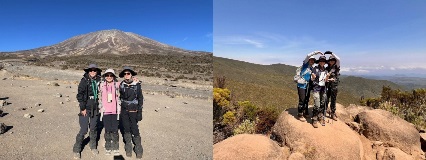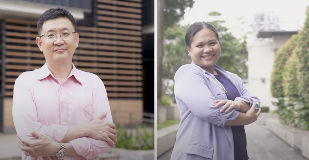As a tribute to her life and legacy, the younger son of the late Ms Margaret Cynthia Walker has established the Margaret C. Walker Bursary and the Margaret C. Walker Prize in Principles of Property Law (JD), in her memory. The Bursary supports financially needy students at the NUS Faculty of Law while the Prize recognises outstanding Juris Doctor students, who have topped their cohort in Property Law, a subject that Ms Walker specialised in and taught as an adjunct faculty in the 1970s.
The following paragraphs, written by the benefactor Justice Philip Jeyaretnam, captures her inspiring story and includes anecdotes from those who fondly remember her:
“Margaret Cynthia Walker was born in 1930 in Bournemouth and had not heard of Singapore, until she was twelve. That was when its dramatic Fall to the Japanese was front-page news in England. Yet Singapore was where she would make her home from 1956 onwards until her death in 1980, at the young age of 50. Having met a debonair young Singaporean at University College London soon after the Second World War, she eventually agreed to come out to Singapore and make a life with him here. Her first job in Singapore was at Rodyk & Davidson as its first female lawyer. She found the firm too colonial and stuffy for her liking, and moved on. Margaret after all was a socialist (although not a firebrand): she was a quiet determined egalitarian. She integrated quickly into the local Bar, becoming a respected conveyancer, and in time the “senior partner” of her husband (whose years in legal service meant his call date post-dated hers, although he was in fact four years older than she was).

Margaret and her husband on their wedding day in 1957. (Photo credit: Henry Woon)
Strong in her faith, Margaret became registrar of the Singapore diocese of the Anglican church. She was also active in a number of charities, including the Samaritans of Singapore of which she became chair. Michael Hwang SC was then a young volunteer with the Samaritans, manning the telephones to receive calls from individuals in distress and at risk of suicide. He remembers that Margaret ‘taught me … to abandon my standard practice of taking detailed notes of everything said by the client. She counselled me that what the client needed was our understanding and empathy … and to win the trust of the client by keeping eye contact at every opportunity, and to work on developing a bond … Our job was not to get all the detailed facts, but get to the root of the issues causing the client serious distress… to give hope that he or she had a friend in his or her corner.’

Margaret in the procession at St Andrew’s Cathedral as diocesan registrar in 1966. (Photo Credit: The Straits Times © SPH Media Limited. Permission required for reproduction.)
Understanding and empathy were virtues Margaret had in spades. Elisabeth Chan recalls how in 1964 and 1965 when she was the most junior member of the Attorney General’s Chambers and had to oversee adoption petitions, she would meet Margaret on summons days, describing her as ‘a very kind, soft-spoken lady who never made a very junior lawyer feel clueless or inadequate’. Margaret at that time handled a regular stream of adoptions for British Army personnel.
Margaret did not live to see her sons graduate from university or the births of her four grandchildren. But a life is not measured by its length, rather by its ‘little nameless unremembered acts of kindness and of love’. With such acts she enriched the lives of others. The institution of this Bursary and Prize would be seen by her in the same light.”






